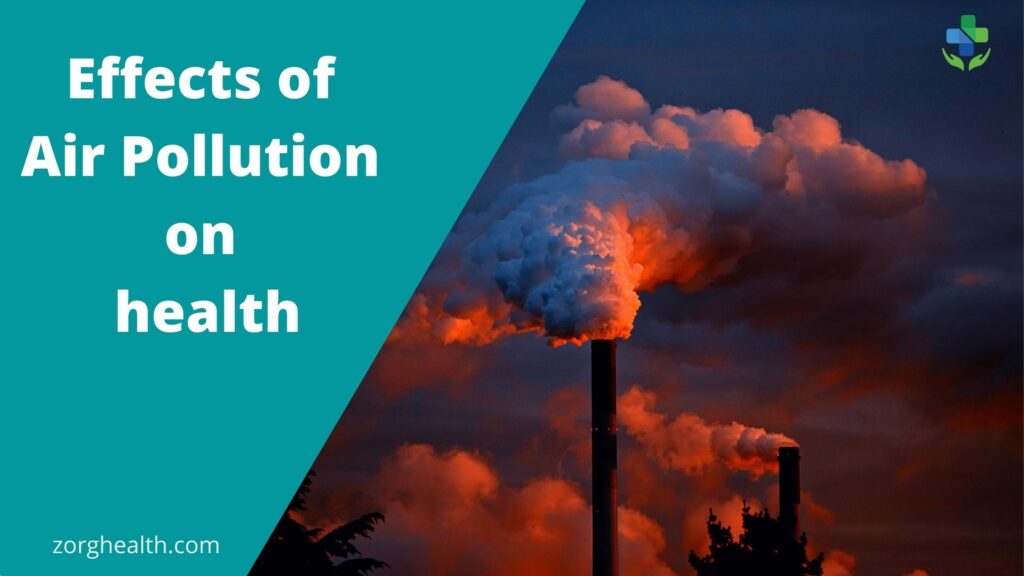Clean air has now become a precious resource and the clear blue sky is a rarer sight. In this article, we talk about What is Air pollution, its causes, and the effects of air pollution on health.
What you breathe matters?. The deteriorating quality of air inhaled has an adverse health effect on our health. Metropolitan cities along with better and larger employment options also have the worst air to breathe. Residents from major cities like- Los Angeles, New Delhi, and similar metropolitan cities are getting used to the frequent warnings on experiencing poor air quality through TV and radio. Often closing down the city becomes the only option to reduce pollution.

What Air Pollution is
Air pollution is an Alarming environmental issue and Polluted air may contain a variety of different chemicals from uncountable sources.
Decades of research studies clearly show that air pollution specifically is a risk factor for lung and heat-related illness and even death, however, the concern is largely ignored even though the need to protect our air and our health should be the utmost priority now more than ever. According to the Global Burden of Disease (GBD) study, pollution caused more than nine million deaths worldwide in 2019, and an estimated three out of five of those deaths were due to heart attack and stroke.
Many studies prove that air pollution is statistically related to, breathing problems, premature death, and admissions to hospital emergency rooms for respiratory and cardiovascular problems. Research shows that people residing in higher levels of air pollution are more likely to develop asthma.
Air pollution is no more just a local issue, as polluted air has the potential to travel far, from state to state and across the country.
Air Pollution Causes
Polluted air contains very small particles and chemicals, which obviously affect your health. The source of these hazardous gases collects from various sources over time.
The hazardous pollutants cumulate from both indoor and outdoor but mainly the contribution of harmful gases is from outdoor activities like burning of fossil fuels in factories and power plants, emissions from growing motor vehicles. There is also a growing concern about the air being polluted by the burning of garbage and firecrackers on different occasions e.g Diwali.
Effects of air pollution on health
Air pollution triggers a variety of health conditions. Air pollution causes lung disease, heart disease and may cause stroke too. The effect can range from short-term issues to long-term issues where we don’t see the damage in health until decades later.
Research shows a strong link between air pollution and respiratory and cardiovascular health problems. The WHO Global Air Quality Guidelines recommend air quality levels for six pollutants that have the strongest evidence of adverse health effects: particulate matter, ozone, nitrogen dioxide, sulfur dioxide, and carbon monoxide. From which most dangerous for our health are particulate matter and nitrogen dioxide, and also the effects appear to be stronger on warm days.
Short term exposure to air pollution
Short-term exposure to air pollution not only increases the risk of heart attacks but also strokes, arrhythmias, and heart failure but also causes skin irritation, burning sensation in the eyes are due to exposure to sulfur dioxide. Headache, fatigue, dizziness, or palpitation are common health concerns with people regularly exposed to air pollution.
At very high concentrations, air pollution irritates and inflames small structures deep inside the lung impacting the respiratory system causing respiratory infections and reduced lung function. This can lead to breathing problems even in people who don’t have asthma.
It also thickens the blood and leads to increased blood coagulation, making blood clots more likely. Pollution makes your blood thicker and increases the heart rate. This can cause clotting which breaks loose and enter the circulation.
Eventually, daily exposure to air pollution may also increase lung hypersensitivity to the allergen that makes asthma symptoms worse.
Long term exposure to air pollution
Long-term exposure to air pollution leads to critical health issues especially premature death, adverse birth outcomes, lung cancer, preterm delivery, cardiovascular diseases.
It can also enable the development of atherosclerosis (narrowing of the blood vessels), high blood pressure, heart failure, and diabetes.
Health risks associated with poor air quality are also very concerning for the growth of children, robbing them of the potential for true lung development and optimal lung function. According to the AHA Trusted Source, the early effects of air pollution tend to affect aged people and people with heart disease.
Signs and symptoms of potential damage due to air pollution
- Frequent cough and cold
- Constant clearing of phlegm
- Runny nose
- Sore throat despite medication
- Burning sensation in eyes even without much straining
Measures to minimize exposure to air pollution
- Limit outside time when the Air Quality Index (AQI) is high. The higher the AQI (red zone – beyond 150 range) and the more you’re exposed to polluted air, the worse the health outcomes are.
- Avoid areas with heavy traffic to limit exposure to poor quality air.
- Try to use public transport or at least consider the carpooling option.
- Close and seal the windows.
- Move your exercise indoors and avoid vigorous outdoor exercise who already have heart or lung problems.
- Monitor Air Quality Index (AQI) before stepping out.
- Introduce an air purifier in your surroundings to clean air. HEPA filters are very good at improving air quality.
- Reduce emissions from vehicles by regular vehicle servicing.
- Create ventilated surroundings.
- Use electrical appliances and equipment with the better Energy Star label.
- Compost or mulch instead of burning yard waste.
- Avoid activities that kick up dust during high pollution levels (example, avoid lighting candles, smoking, fires, vacuuming)
- Shift society-wide transition from coal, oil, and gas to wind and solar energy.
- Make lifestyle modifications to control many risk factors for heart disease (walk, cycle, exercise).
- Address issues on climate change.
Living in a big or busy city might cost you your health. Keep a watch for the quality of air around you. Wearing a mask even at home is a good option. Limit outdoor exposure and consult your doctor if you have the above-mentioned problems. These are the effects of air pollution on health and you have to periodically monitor your health.
